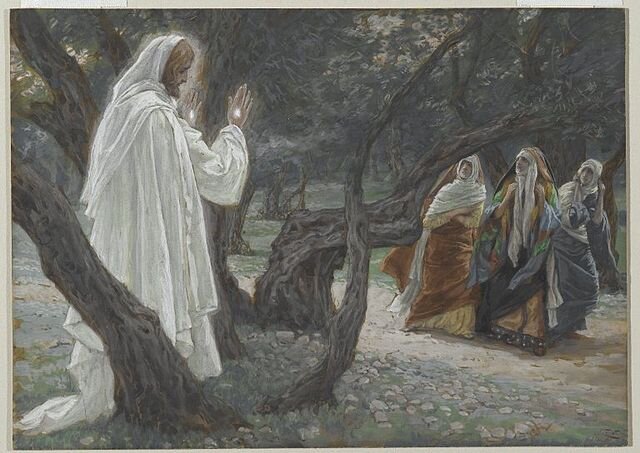Breaking Open the Word - 3rd Sunday of Easter, Year B
3rd Sunday of Easter, Year B — April 18th, 2021
After taking a break during the Lenten season and Easter Octave, we are happy to be bringing you the fruits of our Scripture sharing reflections once more! Though Easter Sunday came and went two weeks ago, we as Catholic Christians are still celebrating the Lord’s Resurrection – and will be doing so for another month yet. There are fathomless treasures to be discovered in the Paschal Mystery during this holy season, and Mother Church gives us an excellent “starting point” in the Mass readings for the Sundays of Easter.
This week, we focused in on the Gospel, which gives St. Luke’s account of Jesus’ appearance in the Upper Room. A Sister started our discussion by highlighting one verse: “Then He opened their minds to understand the Scriptures.” When we approach the Word of God, do we recognize that it is truly a grace to understand it as God intends us to? Biblical exegesis and research can do much for us, and they certainly have an important place in Scripture study, but ultimately the ability to penetrate the deeper meaning of the sacred texts is a gift from the One Whose Word they are. After all, the Apostles had spent 3 years listening to Our Lord teach, but they remained in the dark about the true meaning of the Old Testament prophecies until Jesus Himself revealed their meaning. Sister also suggested that this principle of needing God’s help to fully understand His Word holds true in our personal lives as well. We each have received the Father’s “personal word” to us – those graces, insights, and experiences that have shaped our relationship with Him throughout our lives. However, to fully appreciate and embrace this word, we must continually return to Him and ask Him to take us deeper into its meaning.
Another Sister highlighted a different aspect of this verse: what must it have been like for the Apostles to have the Scriptures suddenly opened to them in this way? We often say that the journey to Emmaus must have been amazing, as Christ explained the Old Testament prophecies to the two disciples, but here that same wealth of information is given all at once! Surely the Eleven must have needed time to process the incredible insights they had received – much in the same way, we must often “unpack” over time a profound grace we have been granted.
Yet, for all this, the Apostles’ understanding is still not quite complete. We find them at the Sea of Galilee attempting to return to their old fishing trade, or at the Mount of Ascension asking about when Jesus will “restore the kingdom to Israel.” In fact, they did not fully comprehend the Gospel message until the day of Pentecost, when the Holy Spirit poured the fullness of His gifts of wisdom and understanding into the newborn Church. The Sacramental life follows a similar path in our own souls: at Baptism we receive sanctifying grace and the Holy Trinity comes to dwell in our soul, but we are still called to grow in our understanding and living of the faith (particularly for those of us who were baptized as infants!). This is the purpose of the Sacrament of Confirmation, the “completion” of Baptismal grace. This new outpouring of the Spirit in our lives gives us the deepened strength that we need to be true witnesses of Christ in the world.
Jesus Appears to the Holy Women by James Tissot
Finally, a Sister shared her insights on the mystery of the Wounds in Jesus’ risen Body. This past Friday, Passionists celebrated the memorial of the Glorious Wounds, the “meeting point” between the Passion and the Resurrection. St. Paul the Apostle teaches that the glorified Body of Christ is the pledge and model of our own final resurrection – “the firstfruits of those who have fallen asleep.” If Jesus retained the marks of His Passion and they shared in His risen glory, then, Sister argued, the same must be true of our own risen bodies at the end of time. We, too, shall have glorious wounds, whether they be physical, psychological, or spiritual. In this life, we tend to be ashamed of and to hide our wounds from others, and our personal woundedness causes endless division and strife. However, in the joy of Heaven, these same wounds will be transformed in glory, and we (like the risen Lord) will delight in showing them to others. Why? Because we can thus better praise the astounding mercy of God who has saved us not in spite of, but even through our wounds themselves!


